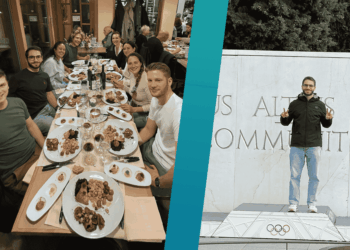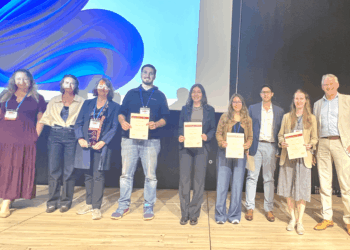If there is a universal virtue that researchers need to have, then it is this one: persistence. Probably because failure is very present in a researcher’s life. Then, what is it that keeps scientists moving forward and overcoming challenges? Probably it is curiosity: curiosity to know what went wrong when an experiment failed and to know what is the result of the hypothesis they wanted to unravel. The same curiosity is key also to stablish new collaborations, to go to conferences, to get new members that were working in a different field and to get new ideas to learn more about.
The same curiosity that makes us explore other disciplines. It comes as no surprise that all fields in research are interconnected: diagnostic machines are the perfect example of applied physics. Most of the treatments that patient undergo are chemical. Another clear example of how beneficial is to expand our horizon are the use of CRISPR-CAS9 technologies, originating from bacteria and archea to defend themselves against viruses, for applied purposes.
Not long ago, I heard that there are different kinds of knowns: “the known-known”, “the known-unknown”, the “the unknown-known” and the “unknown-unknown”. The first, “the known-known” refers to the things we know we know. The “known-unknowns” is to say we know there are some things we do not know -hypothesis-driven research aims to resolve the “known-unknows”. The “unknown-known” refers to the things we do not know we know -things we take for granted. The “unknown-unknown” refers to things we do not know we do not know -this concept seems quite tricky. Curiosity-driven exploration may lead to discover what was so far an “unknown-unknown” and may lead to the discovery of CRISPR-CAS9 in bacteria -that is a very clear example of the importance of fundamental science.
Curiosity is thus fundamental in research and that may lead to the assumption that scientists have the same kind of mind as kids: they never stop asking. But curiosity is not the only factor in play. When researchers are asked what drives them to work, most answer that it is for a better future, as a way to make progress and advance. As broad as this can be, a huge motivation to keep doing research are patients -thus the involvement of patient advocates is essential for the perspectives they bring. It may seem intimidating to interact with them -how should a conversation start?-, but it is extremely rewarding.
About the author:
Anna Salamero Boix is about to defend her doctoral project on brain metastasis and plans to start her postdoctoral training soon. She would like to indagate on the role of the immune system in metastasis. Apart from that, she is Cancer Director of Open Box Science Seminars and she likes to talk about science with the broader public.
About this article
This is one of our shortlisted entries for the 2024 EACR Science Communication Prize themed around our #KeepResearchCurious campaign. Choosing a winner was incredibly difficult and we’re delighted to share our shortlist with you.
The header image of this article was created using AI.








